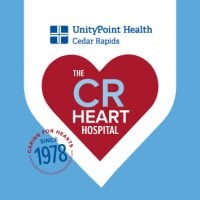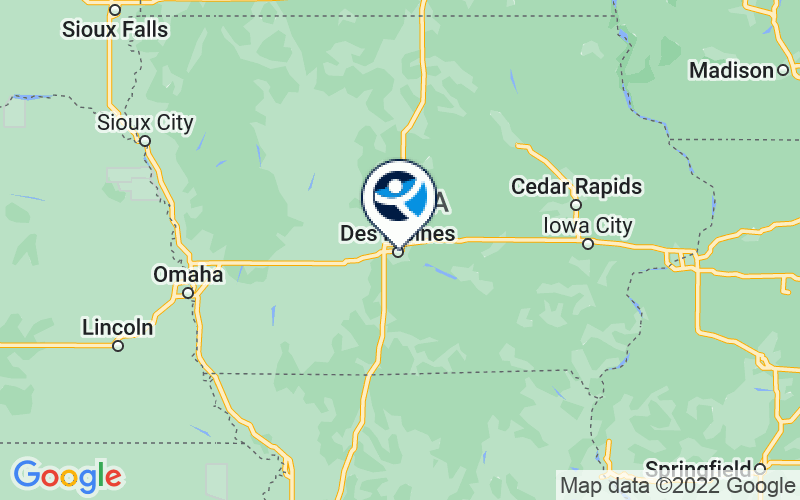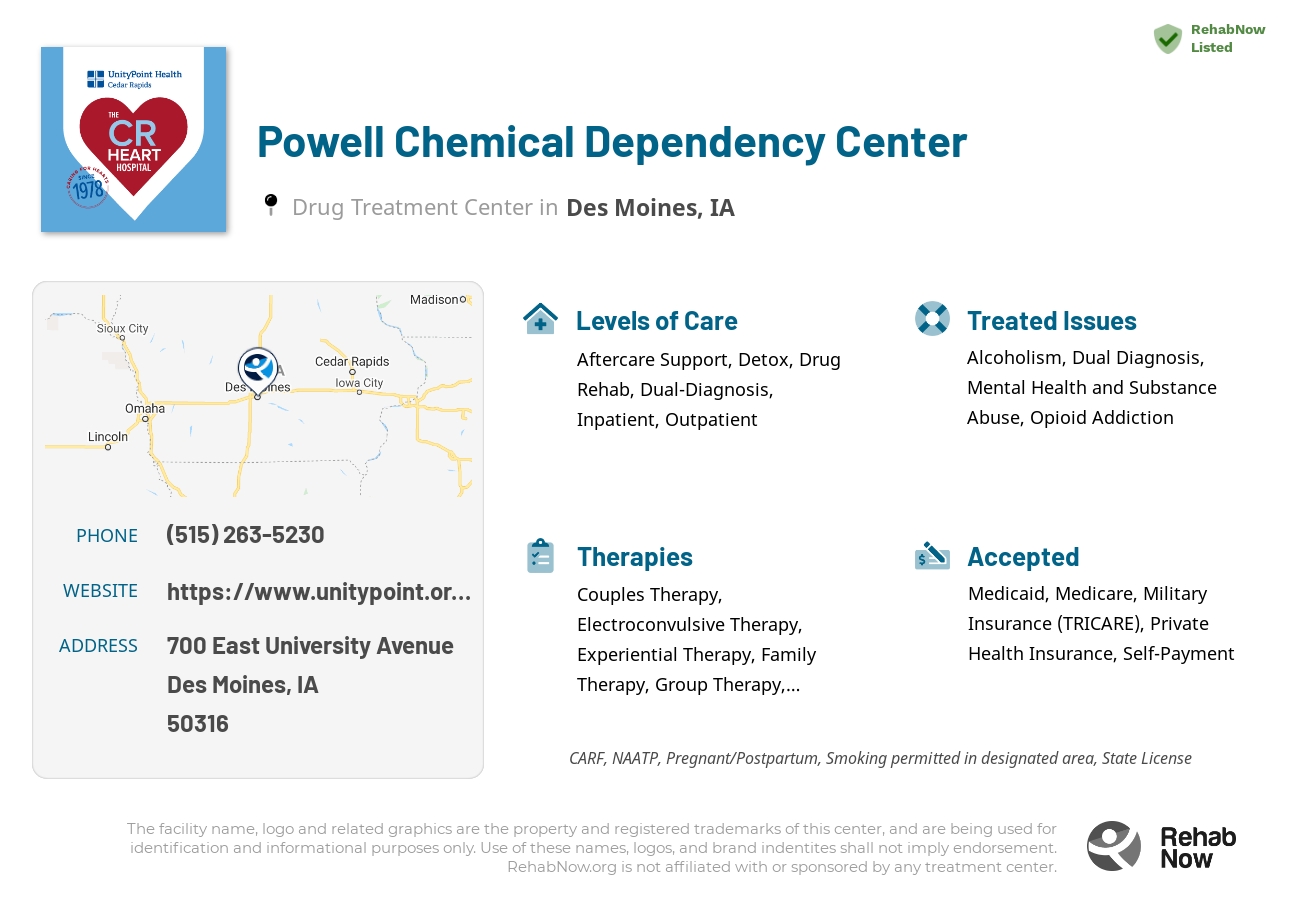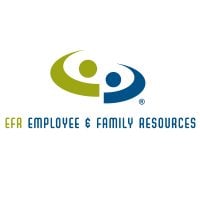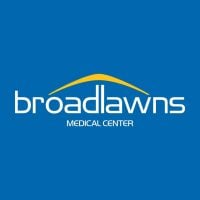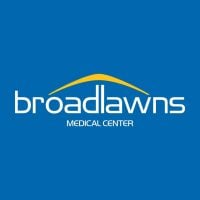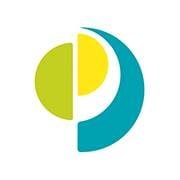Powell Chemical Dependency Center
Drug Rehab Center in Des Moines, Iowa
Powell Chemical Dependency Center in Des Moines is a private and outpatient treatment center specializing in adult and adolescent addiction treatment services, offering evidence-based and holistic treatments, with the goal of empowering individuals to lead a healthier, substance-free life, while also providing support for families, and accredited by CARF and the State of Iowa Social and Health Services.
About This Iowa Facility
Powell Chemical Dependency Center in Des Moines, Iowa is a private and outpatient treatment center specializing in adult and adolescent addiction treatment services. With a staff of trained and caring professionals, the center offers evidence-based and holistic treatments, such as cognitive-behavioral and motivational therapies, to help those seeking recovery. The goal of all care is to empower each individual to make the personal changes needed to lead a healthier, substance-free life.
Powell Chemical Dependency Center offers both individual and group therapy sessions to help individuals with substance abuse issues. These counselors focus on helping individuals recognize their addiction and develop the skills to cope with recovery. Additionally, the center provides support for families, encouraging them to participate in the recovery journey and providing resources to help them learn how to adjust to life after treatment. Additionally, clients can take advantage of the 12-step program, relapse prevention activities, and even mental health services.
Powell Chemical Dependency Center holds accreditation from the Commission on Accreditation of Rehabilitation Facilities (CARF). They also hold a license from the State of Iowa Social and Health Services, and have been awarded with the 2018 Iowa Quality Award. Additionally, the center is unique in its partnership with Des Moines University, which allows students to observe and participate in therapy sessions and interact with clients, giving them an opportunity to learn more about substance abuse and addiction.
Genders
Ages
Modality
Additional
Conditions and Issues Treated
Opioid addiction is the result of repeated use, or abuse, of opioid drugs. It is recommended for people who are dependent on opioids, or who have a high risk for dangerous health concerns, to seek professional treatment. Treatment plans usually include behavioral therapy and medication-assisted treatment.
Opioid drugs include: fentanyl, heroin, methadone, oxycodone, and oxymorphone.
Opioid addiction treatment is beneficial for:
- People who have a history of severe withdrawal.
- People with a high risk for dangerous health concerns.
- People having difficulty overcoming opioid addiction on their own.
There are different kinds of Dual Diagnosis:. A person who simultaneously experiences both a mental illness and an addiction disorder. Or, a person who experiences one or more coexisting (simultaneous) mental health conditions in addition to a primary substance use disorder.
The treatment requires a multi-disciplinary approach, it’s crucial for individuals to partner up with a healthcare provider who understands all the recovery components.
Levels of Care Offered at Powell Chemical Dependency Center
This center offers a variety of custom treatment tailored to individual recovery. Currently available are Aftercare Support, Detox, Drug Rehab, Dual-Diagnosis, Inpatient, Outpatient, with additional therapies available as listed below.
Detox is the stage of recovery where the drugs or alcohol are entirely removed from your body. There are two different ways to detox, with medications and without. For many drugs and alcohol, the acute phase of detox can be completed in a number of days.
Inpatient treatment is the most intensive level of care, and it’s necessary for those who aren’t able to control their addiction. These patients also must be drug-free before attending inpatient programs .
During inpatient treatment, addicts live at an inpatient facility 24 hours a day while receiving help. This type of program is generally recommended for those who need to go through detoxification or who are struggling with serious addiction-related issues.
The outpatient programs in Des Moines, IA are for those addicted drugs or alcohol. The goal of the outpatient rehabilitation program is to make them stop abusing drugs or alcohol, reduce drug use or addictive behaviors, and become entirely sober. It is generally required to attend the outpatient program for 10-12 hours every week.
Patients can be administered on-the-spot medication to ease withdrawal symptoms such as anxiety, increased heart rate, and even depression. Groups such as Alcoholics Anonymous (AA) and Narcotics Anonymous (NA) can be used as a part of outpatient treatment to help maintain sobriety.
Aftercare support is a service many addicts need to ensure their success at recovery. This service usually includes one-on-one or group therapies, assistance from a sponsor and other types of help designed to make sure the patient continues living a life free from drugs.
Patients also may require medication to help them battle addiction. Some people have been able to successfully recover without additional medications, but others have found that they need help during their transition. Long-term, the patient must take the initiative to attend meetings and receive help from other addicts in recovery.
Therapies & Programs
People in addiction recovery can benefit from individual therapy. This type of therapy involves meeting with a therapist one-on-one. This allows for a personal and trusting relationship to be built so that the patient can be truly themselves and express any emotions they feel. Individual therapy leads to greater understanding and peace about your triggers for addiction and coping strategies to prevent relapse.
Couples therapy for drug addiction is based on the belief that addiction is a family disease. Everyone involved with an addict, not just the addict themselves, is affected by their behavior and the changes the addict goes through. The relationship also changes the addict’s significant other and has likely picked up some codependent behaviors. Codependency is a term used to describe a person obsessed with another person and their needs and feelings while neglecting their own. Addicts are usually people-pleasers, so it is understandable how one can become codependent in relationships with addicts.
Family therapy is a type of group problem-solving that aims to improve communication and relationships between the patient, their family, and sometimes friends. The main goal of family therapy for drug addiction is to create an environment where communication can occur without judgment, hostility, or blame. The therapist is with the family as they learn to communicate with each other differently, especially with the addict when s/he is using.
Group therapy sessions are held in rehab facilities, clinics, churches or community centers that offer drug addiction treatment. People who attend these groups are encouraged to voice their feelings and support other addicts in recovery. This helps group members strengthen their own recovery program while cheering on others who are struggling with sobriety.
Group therapy sessions provide recovering addicts with a chance to cope with everyday situations that many face. Group therapy sessions are held in rehab facilities, clinics, churches or community centers that offer drug addiction treatment.
People who attend these groups are encouraged to voice their feelings and support other addicts in recovery. This helps group members strengthen their own recovery program while cheering on others who are struggling with sobriety.
Cognitive Behavioral Therapy (CBT) helps addicts identify faulty, negative thinking so that they can work together with the therapist to find healthier ways of thinking. CBT focuses on specific aspects of each person’s thinking, feeling, physiology, and behavior. It aims to identify specific problems in these areas, and create a personalized treatment strategy.
Patient Experience
Experiential Therapy at Powell Chemical Dependency Center
Experiential Therapy allows addicts to release emotions in a safe environment. The process involves addicts painting their feelings and releasing them on a canvas. LPE – Love, Peace, and Equilibrium is one of the most popular forms of experiential therapy.
Payment Options Accepted
For specific insurance or payment methods please contact us.
Is your insurance accepted?
Ask an expert, call (888) 674-0062
UnityPoint Health Associated Centers
Discover treatment facilities under the same provider.
- New Horizons in Muscatine, IA
- St. Luke's Hospital in Cedar Rapids, IA
- CADS - Center for Alcohol and Drug Services - Locust in Davenport, IA
- CADS - Center for Alcohol and Drug Services - Davenport in Davenport, IA
- Unity Point Health Berryhill Center in Fort Dodge, IA
Learn More About UnityPoint Health Centers
Additional Details
Specifics, location, and helpful extra information.
Des Moines, Iowa 50316 Phone Number(515) 263-5230 Meta DetailsUpdated November 25, 2023
Staff Verified
Patient Reviews
There are no reviews yet. Be the first one to write one.
Des Moines, Iowa Addiction Information
Iowa ranks 2nd lowest in the nation for illicit drug use, but 12% of its residents are still using these drugs every single year. Methamphetamines account for more than 90% of all drug-related prison admissions in Iowa. Alcohol is the most widely abused substance in the state, with 23% of residents admitting to heavy drinking.
In Des Moines, the number of drug-related deaths has increased in recent years. In 2013, there were 31 drug-related deaths, which is up from 26 in 2012 and 23 in 2011. The majority of these deaths were caused by heroin or prescription opioids. Some of the most commonly abused drugs include marijuana, cocaine, heroin, and prescription opioids. If you or someone you know is struggling with addiction, please reach out for help.
Treatment in Nearby Cities
- Creston, IA (54.2 mi.)
- Orange City, IA (158.6 mi.)
- Bloomfield, IA (85.6 mi.)
- Cherokee, IA (127.3 mi.)
- Clarion, IA (78.4 mi.)
Centers near Powell Chemical Dependency Center
The facility name, logo and brand are the property and registered trademarks of Powell Chemical Dependency Center, and are being used for identification and informational purposes only. Use of these names, logos and brands shall not imply endorsement. RehabNow.org is not affiliated with or sponsored by Powell Chemical Dependency Center.
